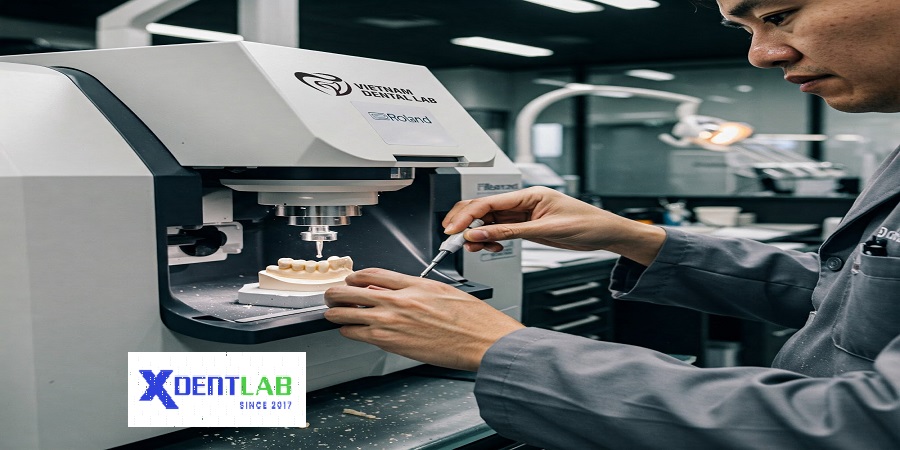
Vietnam dental laboratory District 7 Ho Chi Minh City outsourcingdentallab.com , Vietnam, has emerged as a significant hub for dental services, particularly through its network of dental laboratories. These establishments play a crucial role in the dental healthcare system, providing essential products and support to local dental practitioners. The dental laboratories in this region are equipped with advanced technologies and skilled professionals, which enables them to deliver high-quality dental appliances, crowns, bridges, and other custom solutions tailored to patients’ needs.
Introduction to Dental Laboratories in District 7
One of the defining characteristics of District 7 is its rapidly developing infrastructure, which has facilitated the growth of modern dental practices and laboratories. With improved accessibility, patients and dentists can benefit from the proximity of these facilities, ensuring timely and effective dental care. Additionally, the district’s strategic location within Ho Chi Minh City allows it to cater to a diverse population, further solidifying its status as an important area for dental services in the region.
The significance of dental laboratories cannot be overstated; they are integral to the workflow of dental clinics. By manufacturing essential dental products and collaborating closely with dental professionals, Vietnam dental lab these laboratories enhance patient care and outcomes. Their presence in District 7 not only showcases the advancement of dental technology in Vietnam but also reflects the increasing demand for high-quality dental services within the community.
As the landscape of dental healthcare continues to evolve, the laboratories in District 7 stand out for their commitment to innovation and quality. This introductory overview sets the stage to explore the various aspects of dental laboratories in the district, shedding light on their contributions to dental practice and the overall health of the population.
Services Offered by Dental Laboratories
Dental laboratories in District 7, Ho Chi Minh City, provide a comprehensive range of services tailored to meet the diverse needs of dental professionals and their patients. One of the primary services offered is the production of dental prosthetics, which includes essential items such as crowns, bridges, and dentures. These prosthetics play a crucial role in restoring function and aesthetics for patients with missing or damaged teeth. Additionally, dental laboratories fabricate orthodontic appliances, which are essential for correcting misalignments and improving overall oral health.
To enhance the precision and quality of their products, many dental laboratories have adopted advanced technologies, including Computer-Aided Design and Computer-Aided Manufacturing (CAD/CAM) systems. These state-of-the-art systems allow for the creation of highly accurate models and prosthetics, minimizing the margin of error associated with manual fabrication. Furthermore, the integration of 3D printing technology in dental laboratories has revolutionized the production process, enabling rapid prototyping and customized solutions that cater to individual patient needs.
The production process often involves the use of high-quality materials, such as zirconia, porcelain, and acrylic resins, which contribute to the durability and aesthetic appeal of the final products. Dental technicians meticulously craft each piece, ensuring they meet stringent quality control standards. They combine artistry and scientific knowledge to create dental solutions that promote both functionality and visual appeal.
Overall, dental laboratories in District 7 are at the forefront of innovation in dental technology. By leveraging advanced equipment and materials, they are committed to delivering high-quality products that enhance patient care. The continuous improvement in techniques and technologies employed in these facilities underscores their vital role in the dental healthcare ecosystem.
Choosing the Right Dental Laboratory
When selecting a dental laboratory in District 7, Ho Chi Minh City, several key factors should be taken into account to ensure quality and reliability. First and foremost, accreditation is vital. A reputable dental laboratory should possess certifications from recognized dental associations, which reflect their adherence to industry standards and best practices. This accreditation serves as a testament to the lab’s commitment to delivering high-quality products and services.
Another significant aspect to consider is the expertise of the laboratory staff. Professionals with extensive experience in dental technology can significantly affect the quality of the final product. Inquire about the qualifications and continued education of the lab technicians. Those who engage in ongoing training are more likely to be up-to-date on the latest techniques and materials, ensuring the best possible results for dental restorations.
Turnaround times are equally important in the decision-making process. Efficient communication and timely delivery can greatly impact the workflow of dental practices. A suitable laboratory should provide clear timelines for different services, allowing dental practitioners to better manage patient expectations. It is advisable to discuss these specifics during the initial consultation.
Quality of materials used in dental products is another essential criterion. Inquire about the types of materials sourced by the laboratory, Dental lab in vietnam as this directly influences the durability and aesthetic aspect of dental restorations. Additionally, testimonials from local dental professionals can offer valuable insights into the laboratory’s performance, highlighting factors such as customer service and responsiveness.
Lastly, fostering a strong partnership between the dental practitioner and the laboratory is crucial for successful collaboration. Establishing clear communication channels and aligning on expectations can lead to more effective outcomes and an enhanced working relationship.
Related Articles: Vietnam Dental Laboratories District 10 Ho Chi Minh City
Future Trends in Dental Laboratories
As the landscape of dental care continues to evolve, the dental laboratories in District 7, Ho Chi Minh City, are witnessing significant transformations driven by emerging trends. One of the most notable shifts is the transition towards digital solutions. The integration of computer-aided design and computer-aided manufacturing (CAD/CAM) technologies allows dental laboratories to produce more precise and quicker restorations. This digital revolution not only enhances the accuracy of dental products but also streamlines the overall workflow, thus increasing efficiency and reducing turnaround times for dental practices.
Moreover, sustainability is becoming a key focus in dental manufacturing. As awareness grows regarding the environmental impact of traditional dental materials and processes, many local laboratories in District 7 are adopting greener practices. This includes utilizing eco-friendly materials and reducing waste through advanced manufacturing techniques. By prioritizing sustainability, dental laboratories not only contribute to a healthier planet but also appeal to environmentally conscious patients, boosting their competitive edge in the market.
Additionally, the rising popularity of tele dentistry has emerged as a noteworthy trend in dental care. Tele dentistry facilitates remote consultations and follow-ups, allowing dental laboratories to communicate effectively with both dentists and patients without the need for in-person visits. This trend is particularly beneficial in a fast-paced urban environment like Ho Chi Minh City, where time constraints can hinder access to dental services. The ability to provide remote assistance and quick responses is likely to enhance patient satisfaction and foster stronger connections between dental laboratories and practitioners.
While these trends present various opportunities, they also pose challenges for local dental laboratories. Staying abreast of technological advancements requires significant investment in training and equipment. Nevertheless, those willing to adapt and innovate are likely to shape the future of dental care in Vietnam positively, making meaningful contributions to the industry.
